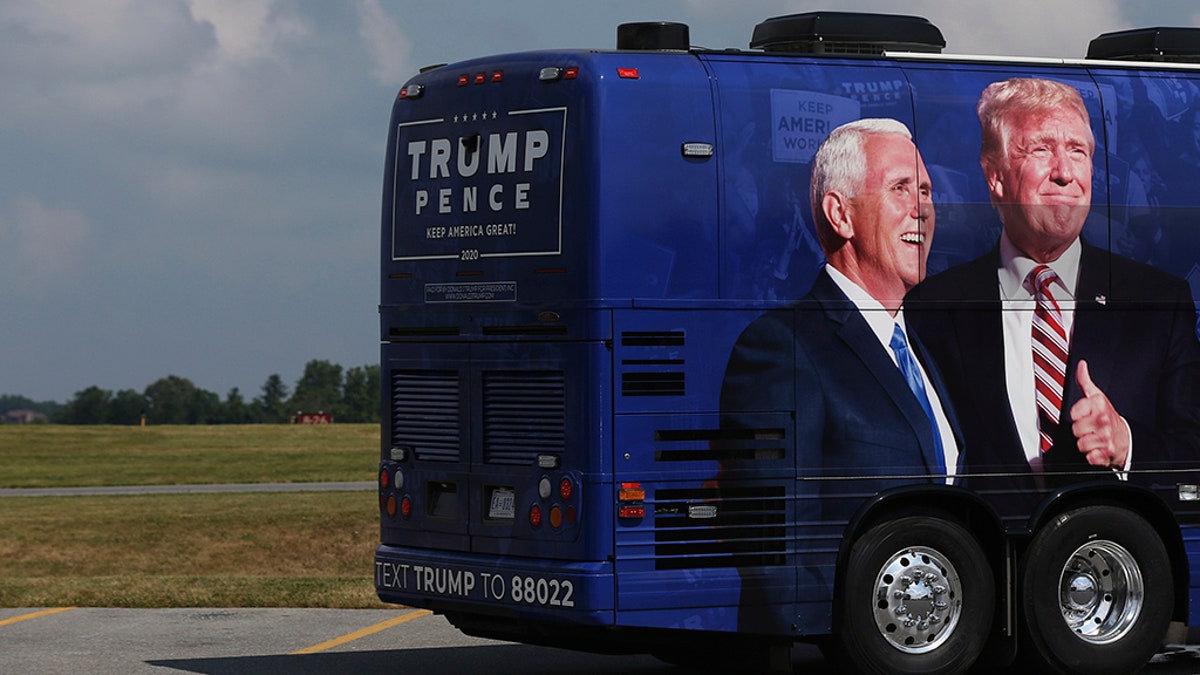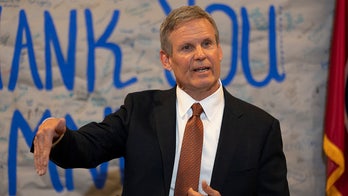Republicans set to counter Democrats' convention narratives
President Trump expected to appear each night of the 2020 Republican National Convention; reaction and analysis from Katie Pavlich, news editor at TownHall.com, Juan Williams, co-host of 'The Five,' Dana Perino, anchor of 'The Daily Briefing, and Chris Stirewalt, Fox News politics editor.
While the 2020 presidential election is still very much up in the air, the early moves in the next race for the White House already are underway.
And whether President Trump wins or loses reelection in November, there likely will be a wide-open race for the 2024 Republican presidential nomination.
THERE'S ALREADY BUZZ ABOUT 2024
Those dynamics are at play at this week’s Republican National Convention. While the event is first and foremost about delivering another four years for Trump in the White House, it will provide some potential 2024 contenders opportunities to briefly grab the spotlight.
Vice President Pence, who will give the crowning address on Wednesday night, is considered likely to run for the top spot in four years.

A campaign bus waits in a lot before Vice President Mike Pence arrives at Lancaster Airport in Lititz, Pa., for a series of stops in Pennsylvania on July 9, 2020. (Tim Tai/The Philadelphia Inquirer via AP, Pool)
The speakers lineup -- which was revealed Sunday, just a day ahead of the convention's kick-off -- also includes a number of Republicans who may have national aspirations in 2024.
They include former South Carolina Gov. Nikki Haley, who served as Trump’s first ambassador to the United Nations; Secretary of State Mike Pompeo; Sens. Tom Cotton of Arkansas, Tim Scott of South Carolina and Rand Paul of Kentucky; and South Dakota Gov. Kristi Noem. And the speech by president's son, Donald Trump Jr., will also spark some speculation.
“It’s never too soon to start thinking about the election after the upcoming one and there’s no doubt that there’s a wide array of would-be 2024 contenders waiting in the wings, watching and jostling for position,” veteran Republican strategist Colin Reed noted.
GOP consultant Alex Conant pointed out that “anyone planning to run for president in 2024 is spending this year building relationships."
"That's obviously harder to do during a pandemic," he said, "but you can still start having conversations with the donors, activists, media and operatives that will be crucial in 2024.
“During a normal convention, you'd see 2024 hopefuls making the rounds with the early state delegations,” noted Conant, a veteran of multiple Republican presidential campaigns.
A VIEWERS GUIDE TO THIS WEEK'S REPUBLICAN CONVENTION
But 2020’s anything but a normal year, and this year’s Democratic and Republican conventions are anything but conventional due to the coronavirus pandemic.
Both confabs are largely virtual – so forget about arenas jam-packed with party officials, lawmakers, delegates, activists and media. And, of course, there are no early primary and caucus state delegation breakfasts and other functions for potential White House hopefuls to mingle and make friends.
Asked if this week’s convention is the start of the next GOP presidential nomination race, Iowa Republican Party Chairman Jeff Kaufmann replied, “This is the first year I would answer that question as no.”
And it’s not just because of the logistics.
“The reason is because of the nature of what’s going on here. I really see this as trying to make the best of a bad situation for getting Donald Trump’s message out there, especially the contrast between him and Biden," noted Kaufmann. “There’s too much at stake. This is not the beginning yet.”
With Trump trailing Democratic nominee and former Vice President Joe Biden in public opinion polling, and with limited ability to campaign conventionally with packed rallies and town halls, the stakes for the conventions have been heightened as Trump tries to reboot his campaign and improve his odds of victory.
“This convention is going to be all about Trump. Some 2024 hopefuls might get a few minutes of TV time, but it's going to be really hard to break through given the format,” Conant highlighted.
David Carney, who's been working on Republican presidential campaigns since the 1980s, agreed that this week’s convention is “really just 100 percent the Trump program.”
But he also emphasized that for those Republicans with potential 2024 national aspirations, “any opportunity to speak to a national audience is a good thing.”
Then-Senate candidate Barack Obama’s speech at the 2004 Democratic convention dramatically boosted his national profile. Four years later he was elected president.
With such history in mind, there’s been plenty of behind-the-scenes jockeying over who’s speaking and when at this week’s convention.
But Reed, who worked on Mitt Romney’s 2012 presidential campaign, cautioned that “I think there’s a wariness among all these would-be contenders that anything that is perceived that is disloyal or harmful to the current president’s re-election could make them a pariah down the road. You think back to the 2016 convention and the one that I think sticks out in most people’s minds is Ted Cruz getting booed off the floor. So I use that as an example of how past can be prologue.”
COTTON VISIT TO NEW HAMPSHIRE STIRS 2024 SPECULATION
Regardless, some of the early moves are already underway.
Pence made stops this summer in Iowa – which kicks off the presidential and caucus calendar – and South Carolina, the first southern stop.
Cotton, a strong supporter of the president, campaigned on behalf of Trump and down-ballot Republicans last month during a two-day swing in New Hampshire, which for a century’s held the first primary in the White House race.
Sen. Rand Paul of Kentucky – a 2016 Republican presidential candidate – is expected to visit New Hampshire this autumn on behalf of GOP candidates.
Noem is scheduled to head to Iowa next week to headline the Pottawattamie County GOP’s annual Lincoln-Reagan Dinner and she’s expected to make a stop in New Hampshire closer to the election.
But it’s not just in-person visits to the early states. Many of the potential White House hopefuls are building bonds with the national donor class – and using their own political action committees to help Republicans in down-ballot races this year. The friendships cemented in 2020 may pay dividends down the road.
Conant, a Republican National Committee veteran who later worked on the presidential campaigns of then-Minnesota Gov. Tim Pawlenty in 2012 and Sen. Marco Rubio of Florida in 2016, highlighted that “one way to make friends is to help down-ballot candidates.”
Conant, who advised Sen. Joni Ernst of Iowa in her 2014 Senate victory, pointed to her current challenging re-election bid. “Anyone looking at a presidential run in 2024 is likely going to do whatever they can to help Joni Ernst win re-election this year,” he noted.






